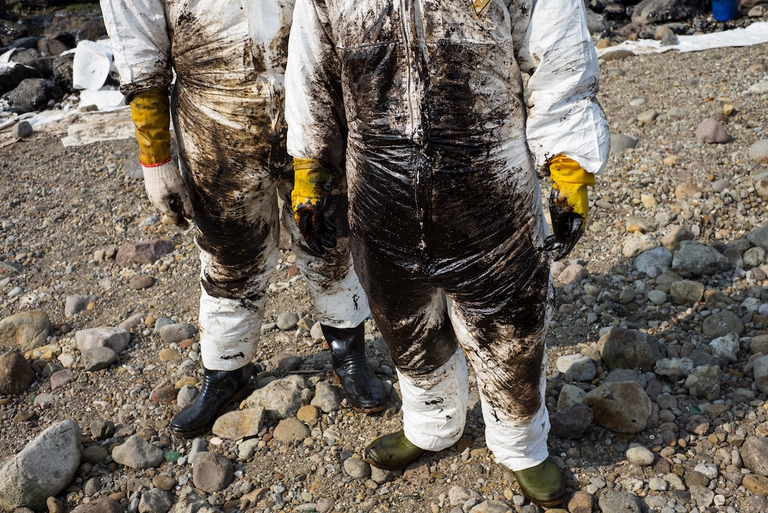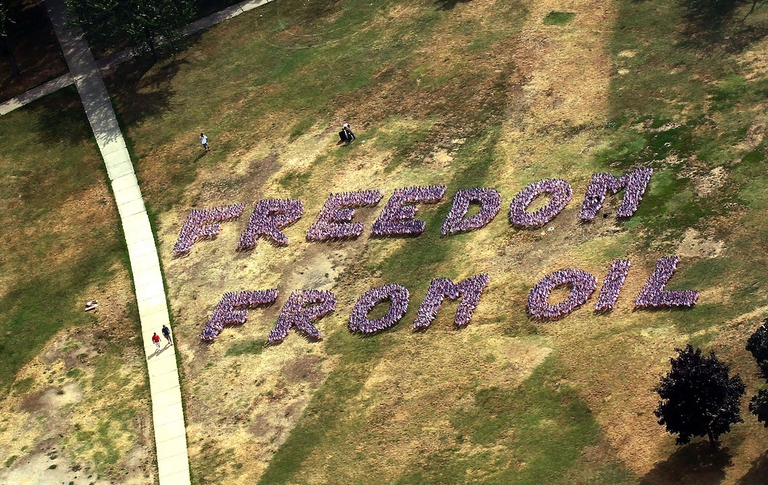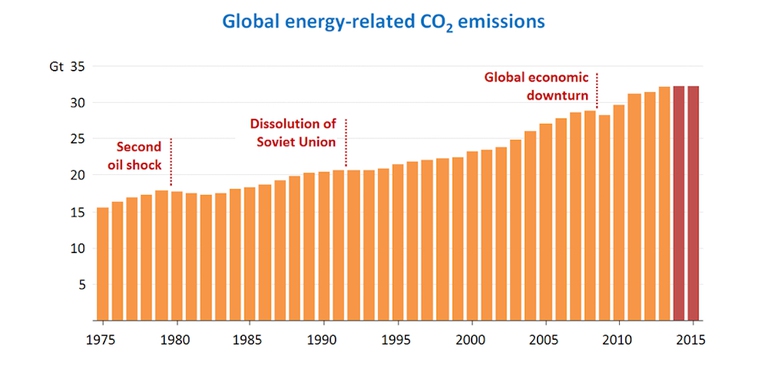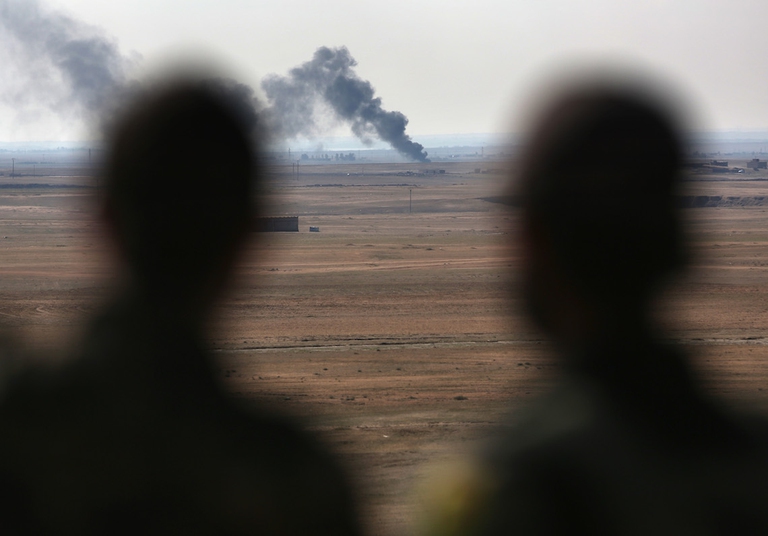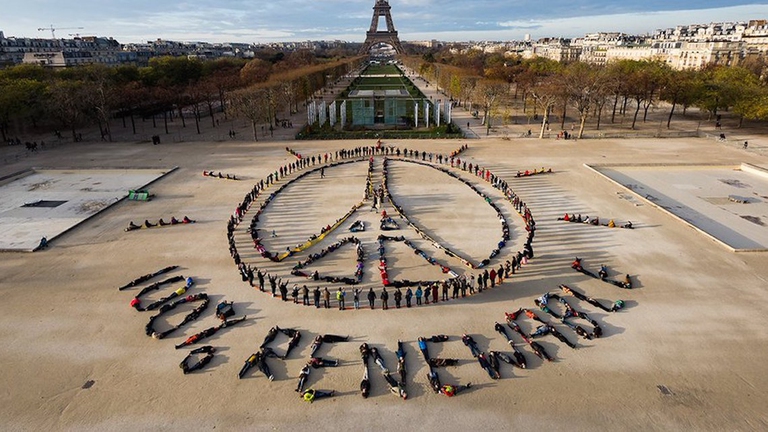
Three people putting the protection of the planet before themselves. Three powerful stories from Latin America, the deadliest region for environmental activists.
The consequences of oil extraction and use are devastating. From the environment to health, from human rights to armed conflicts.
“I don’t think there is a more ideal country for renewables than Saudi Arabia”. The person who stated it on 17 March 2016 was not an environmental activist but Ali al Naimi, Saudi Arabia’s Minister of Oil. The country is the second largest producer of crude oil (the first is the United States), with as many as 11.5 million barrels a day.
It’s not a case that, according to Bloomberg, the Arab monarchy seems to have long planned the energy transition, planning to install 54 gigawatts of clean energy capacity by 2040.
| Classifica (1 = l'anno più caldo dal 1880 al 2015) | Anno | Anomalia in °C |
| 1 | 2015 | 0.90 |
| 2 | 2014 | 0.74 |
| 3 | 2010 | 0.70 |
| 4 | 2013 | 0.66 |
| 5 | 2005 | 0.65 |
| 6 | 1998 | 0.63 |
| 6 | 2009 | 0.63 |
| 8 | 2012 | 0.62 |
| 9 | 2003 | 0.61 |
| 9 | 2006 | 0.61 |
| 9 | 2007 | 0.61 |
| 12 | 2002 | 0.60 |
| 13 | 2004 | 0.57 |
| 13 | 2011 | 0.57 |
| 15 | 2001 | 0.54 |
| 15 | 2008 | 0.54 |
It seems that the revolution is about to begin. However, our societies still strongly depend on oil. Which doesn’t mean that we only depend on petrol, but even on plastic, tarmac, lubricating oil, kerosene, tar and diesel. It is estimated that every day about 90 million barrels of oil are used all over the world, the equivalent of over 30 billions a year.
For this reason the nuclear power lobby insists that it is necessary to invest in atoms. But it forgets that reactors also use sources we’ll sooner or later run out of. In fact there are high reserves of uranium in the world but – as a 2012 documentary by Dermot O’ Connor explains – if we decided to produce the same amount of electricity generated by fossil fuels with nuclear power, at least 10,000 plants would be necessary. And these would use up all the existing uranium reserves in less than 20 years.
It’s not an opinion but a fact that long-term solutions are needed. Nonetheless, tens of governments around the world seem to be inclined to support oil extraction. The United States invested huge amounts of money in shale oil, despite the environmental risks that it poses. Canada did the same with the harmful bituminous sand.
These new productions substantially increased the global demand, lowering the oil price per barrel. And the member countries of OPEC, instead of stopping the production of oil to rebalance the market, strongly increased it to go into competition with the United States.
The black gold rush hasn’t come to a stop neither for environmental nor for economic reasons. Evidence comes from the fact that there are ever more oil conflicts in the world involving countries that want to take control of wells, drills and oil refineries. These wars often erupt due to extreme weather conditions mostly caused by climate change, which is in turn caused exactly by the use of fossil fuels (that still today account for 80% of global energy consumption).
The Syrian case in this sense is emblematic. The country, according to a study conducted by Le Monde, in 1996 reached the “peak oil”, the moment when the maximum rate of extraction of petroleum is reached, after which it progressively declines. So, in the following years the rate of extraction diminished.
In 2008, in an effort to tackle the public deficit, the Bashar al-Assad regime substantially reduced fuel subsidies that accounted for 15% of the GDP. Therefore, the price of petrol soon tripled, causing uncontrollable inflation levels even as regards agricultural prices.
Extreme weather conditions also added to this dramatic situation: from 2007 to 2010, Syria experienced the worst drought in its history. This extreme phenomenon was caused by climate change, which was in turn triggered by the use of fossil fuels. The population’s despair and the extremists’ goals led the country in a war that has been raging for five years.
Yemen also reached the peak oil in the early 2000s: in brief, the production decreased and today Sana’a is also in war. Algeria is also likely to have reached the peak oil and Venezuela, Mexico, Indonesia, Russia, Iran, Nigeria and China saw irreversible decrease in production levels.
So the world is at a crossroads. On one hand, keeping on expanding an energy production system that is dangerous for the environment, economy, society and climate. On the other, start a transition towards a new way of producing energy: a clean, eco-friendly, renewable way that both rich and poor countries can afford.
A transition that would avoid 3.7 million dead, according to the WHO the number of people who in 2012 died as a consequence of air pollution all around the world. Many other people working on oil platform add to these victims: just consider the Deepwater Horizon that killed eleven people ein 2010 after an explosion in the Gulf of Mexico that is considered one of the worst environmental catastrophes ever.
And consider also the environmental damage that oil causes locally. For example: Ken Saro-Wiwa, an environmental activist who fought for the local population’s rights, was killed after a process that was considered by the majority of the international community a farce because of pollution caused by oil exploitation in the Niger Delta.
Siamo anche su WhatsApp. Segui il canale ufficiale LifeGate per restare aggiornata, aggiornato sulle ultime notizie e sulle nostre attività.
![]()
Quest'opera è distribuita con Licenza Creative Commons Attribuzione - Non commerciale - Non opere derivate 4.0 Internazionale.
Three people putting the protection of the planet before themselves. Three powerful stories from Latin America, the deadliest region for environmental activists.
Influential scientist, activist and author Vandana Shiva fights to protect biological and cultural diversity, and against GMOs.
Kimiko Hirata has blocked 13 new coal plants in Japan, but she hasn’t done it alone. The 2021 Goldman Prize winner tells us about her movement.
The Goldman Environmental Prize, the “green Nobel Prize”, is awarded annually to extraordinary activists fighting for the well-being of the planet.
We talk to Shaama Sandooyea, activist and marine biologist from Mauritius onboard Greenpeace’s Arctic Sunrise ship in the heart of the Indian Ocean.
Arrested for supporting farmers. The alarming detention of Disha Ravi, a 22-year-old Indian activist at the fore of the Fridays for Future movement.
Water defender Eugene Simonov’s mission is to protect rivers and their biodiversity along the borders of Russia, China and Mongolia.
Chibeze Ezekiel, winner of the 2020 Goldman Environmental Prize for Africa, is fighting to guide new generations towards a renewable future.
Leydy Pech, winner of the 2020 Goldman Environmental Prize for North America, is the beekeeper who defended Mexican Maya land against the agro-industry.
